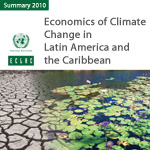The ECLAC report titled “Economics of Climate Change in Latin America and the Caribbean” estimates losses of around 1% of annual GDP in the region between 2010 and 2100 unless a global consensus is reached on mitigation actions.
 8 December 2010: The UN Economic Commission for Latin America and the Caribbean (ECLAC) has released a report titled “Economics of Climate Change in Latin America and the Caribbean,” which estimates losses of around 1% of annual GDP in the region’s countries between 2010 and 2100 unless a global consensus is reached on mitigation actions.
8 December 2010: The UN Economic Commission for Latin America and the Caribbean (ECLAC) has released a report titled “Economics of Climate Change in Latin America and the Caribbean,” which estimates losses of around 1% of annual GDP in the region’s countries between 2010 and 2100 unless a global consensus is reached on mitigation actions.
The study, presented during the Cancun Climate Change Conference provides supplementary socioeconomic analysis of the implications of climate change, based on national and sectoral studies being carried out in the region. The 2010 report states that, although Latin America and the Caribbean is the second least polluting world region in terms of greenhouse gas (GHG) emissions, the region could suffer significant consequences from climate change in terms of its impact on the population, ecosystems and economic activity. According to the study, the cost would be higher in Andean, Central American and Caribbean countries.
Central America is extremely vulnerable to climate change as a result of its socioeconomic situation, its exposure to extreme events and its high level of biodiversity. ECLAC calculates that, by 2100 in Central America, the rise in atmospheric and sea temperature, declining and unstable rainfall, rising sea levels, droughts and hurricanes will have repercussions on production, infrastructure, livelihoods and health and safety of the population, as well as weakening the environment’s capacity to provide vital services and resources.
The report was produced by ECLAC in collaboration with the Governments of Denmark, Germany, Spain and the UK, as well as with the EU, the Inter-American Development Bank (IDB), the Global Mechanism of the UN Convention to Combat Desertification (UNCCD) and a broad network of academic and research institutions. [ECLAC Press Release] [The Report]